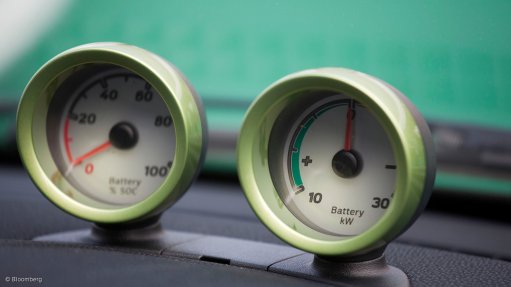
Dials showing battery charge are seen inside the Daimler AG Mercedes-Benz Smart electric vehicle (EV). Australia’s Dakota Minerals is banking on the European EV market to boost demand for lithium.
JOHANNESBURG (miningweekly.com) – In separate transactions, two Australian exploration companies on Wednesday announced their expansion into Europe, with Dakota Minerals set on Europe’s largest lithium producing country, Portugal, and Capital Mining setting its sight on projects in Ireland.
Dakota had signed a binding agreement to acquire rights to a significant tenement package in all three of Portugal’s regions prospective for spodumene and petalite-hosted lithium pegmatites – Serra de Arga, Barroso-Alvao, and Almendra-Barca de Alva. Each of the three districts was comparable in size or larger than the Pilgangoora region in Australia, which hosted the company’s Lynas Find lithium project.
The exploration tenements, which Dakota was buying from Portuguese explorer Lusorecursos, were a mixture of granted leases and new applications.
Combined with the Lynas Find project, MD David Frances said the acquisition provided Dakota key market diversification and exposure to the Asian and European battery markets.
“We see Europe as an instrumental part of the growing electric vehicle (EV) market, with likely the highest EV penetration rate in the near term, making Dakota’s new Portugal project strategically located relative to this market,” Frances commented.
The company pointed out that Europe was leading the world in uptake of EVs using lithium-ion batteries, with EVs already totalling 22% of all new-vehicle sales in Norway. Lithium-ion battery production capacity in car-producing countries, such as Germany, was growing sharply to keep up with demand. Automotive manufacturer Daimler recently announced a new €500-million battery factory and Volkswagen was likely to follow suit.
“Battery producers will need more supply from safe, nearby jurisdictions,” the company stated.
The acquisition terms for the Dakota transaction include a €10 000 upfront option cash payment to Lusorecursos; a €10 000 cash payment and €63 000 six-month consulting contract on the successful grant of experimental exploration rights for tenements MNPPP0274, 275 and 276, as well as a €250 000 milestone payment on definition, within the tenements, of a five-million-tonne code-compliant lithium resource at 1.2% lithium oxide and €750 000 milestone payment on definition within the tenements of a 15-million-tonne code-compliant lithium resource at 1.2% lithium oxide.
Meanwhile, Base and precious metals explorer Capital Mining had also announced its intended entry into the lithium industry in Europe and had signed a binding agreement to acquire unlisted Wolfhound Lithium, which holds seven prospecting licence applications.
The licence applications covered three projects in the Leinster Granite in the south-east of Ireland, which was similar to Talison’s Greenbushes lithium project, in Western Australia.
“The area of the Leinster Granite is very tightly held and has been of interest for its lithium potential since the 1970s,” the company reported.
Capital director Peter Dykes said that the acquisition, which was subject to a due diligence, was consistent with its growth strategy of building a portfolio of high potential lithium assets and systematically assessing their potential to host significant lithium deposits.
Capital was required to issue Wolfhound 15-million shares to be granted the 90-day due diligence option period, followed by a 50-million share settlement upon completion of the acquisition.
Capital would also reimburse the shareholders of Wolfhound for certain costs of applying for the tenements.